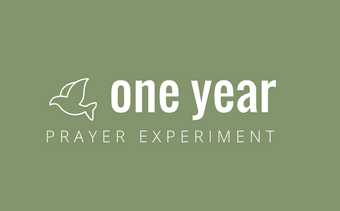A recent post here on the One Year Prayer Experiment taught us about lament.
Since then, I set out to try praying prayers of lament. My timing turned out to be pretty good, given events in the world. And events in my own life.
In the process, I really found myself lamenting on two different levels.
Big Picture Lament

The first level of lament involved the bigger picture. This bigger picture includes world events. Events like civil wars, natural disasters, and economic downturns. This bigger picture also includes systemic issues. Issues of injustice, inequality, racism, and the like.
The crucial common thread in these bigger picture problems is that all of them are completely out of our individual control. There is no decision we can make by ourselves that can fix these problems. Our individual choices might be able to reduce our contribution to the issue. Or, our choices might serve to alleviate some of the suffering involved. But in the end, we cannot solve the problem all by ourselves.
Two bigger picture issues weighed particularly heavy on my heart the last few weeks. The first is the Florida school shooting. It is always a tragedy when this happens. This time, I particularly hurt for the parents. I had always thought primarily of the students, but this time I was particularly burdened for the parents. Seventeen parents didn’t see their kids come home that day. That breaks the heart. And I cannot do anything to undo that day. But I can lament.
The events in Syria also weight heavy upon my heart. News coverage spills a lot of electronic ink debating who bombed who and telling us what the UN is trying to do. Yet human suffering is occurring on unprecedented levels. BBC news recently did a story that featured a little Syrian girl. Her picture was at the top and she was quoted as saying, “At least in heaven there is food.” True Despair. Again, I cannot stop the fighting in Syria. So, I lament.
Small Picture Lament
![]() I found as I explored lament, another dimension of it emerged. This is what I would call small picture lament. This level of lament consists of all the hurt, pain and suffering that happens in our own lives. In our own little worlds. This is pain found close to home. This is local.
I found as I explored lament, another dimension of it emerged. This is what I would call small picture lament. This level of lament consists of all the hurt, pain and suffering that happens in our own lives. In our own little worlds. This is pain found close to home. This is local.
Ironically, in small picture lament, we still don’t have much control. This time the cancer strikes a family member. This time the economic downturn causes our loved one to lose their job. The tsunami strikes our hometown. The effects of this suffering are felt nearby, and deeply. And often we have no more control over these events that happen in our lives than we do the big picture events, like Syria.
Perhaps in the ultimate demonstration of God’s timing, within a week of putting up our post on lament I received some bad news. Some events happened that could spell the end of my small business. Nothing I did caused these events to happen. Nothing I could have done could have prevented them. And it is looking like there is little I can do to fix it. Talk about hitting home. This is time for lament.
Both Levels of Lament are Important
It is important that we as followers of Christ, lament on both levels.
Value of Big Picture Lament
Our social justice minded brothers and sisters in Christ helpfully remind us that as believers it is imperative that we know what is going on around us. The Bible commands us to love and serve our neighbors. Yet, if we are blissfully unaware of their needs – or even their existence – we can never fulfill the Biblical command.

One reason we avoid awareness of others, and in particular their hurts and struggles, is that we are afraid to enter their pain. It hurts us to fully recognize others’ pain. Especially if we are powerless to affect change. We do not like to hurt. We don’t want to hurt, so we tune out others who hurt.
Lament turns this thinking on its’ head. Before lament entered the prayer tool box, we had nowhere to go with others’ suffering. Through lament, we now have a place to take the suffering of others. We can take it to God and process it with him. Then we can act in whatever ways we can.
Small Picture Lament Vital Too
Like any thinking, this can be taken too far. Some will teach we must be so concerned with others that we must never think about our own problems. Or, that we are to utterly diminish our own problems in light of the ‘real’ struggles of others. They will say, “How can you think about your problems like that, so many others have it worse.”
This is wrong thinking. It is not wrong to acknowledge our emotion and feelings of powerlessness. Even Jesus wept in front of Lazarus’ tomb. It is wrong, however, to allow our feelings to become all consuming, to allow them to become central to our identity. To allow them to rule.
Lament is a powerful two-sided coin when it comes to small picture hurts. First, lament is powerful because it creates a context where we can express hurt and frustration. We can let the emotion out, and we can be raw with God. Peruse a few of Job’s laments, we might be surprised by what we read.

Second, lament also puts bounds on the expressed emotion. As soon as we express the hurt and despair, we immediately shine the light of God on it. We ask God to act. Some else is invited to help. A person who we openly acknowledge is loving enough, powerful enough, and wise enough to actually do something about the trouble.
We get the hurt out there but quickly fence it in. Calls to God for help and reminders of God’s character put boundaries to the emotion. The emotion is never allowed to overrun our lives or take over our hearts.
In the end, lament acts as a bridge from being emotionally and relationaly healthy to fully serving God.
It’s (NOT) About Time . . .
Time was a big question mark as I began my first few attempts at lament. I knew lament was different than other forms of prayer. Lament is not like Praise, or thanksgiving, or prayer walking. These and many other forms of prayer are easy to put the clock to. “I will prayer walk for 30 minutes.” Simple and done. But lament is more of an expression of emotion. Thus, I was careful to not set unrealistic time goals for this type of prayer. What I found was a very flexible way to pray.
Some Lament Was Short
I found some of my prayers of lament to be short. That is okay. Psalm 13 is a prayer of lament, and that Psalm contains only six verses! King David was bothered by his circumstances, yet he found he was able to fully express his lament in six verses. Lament does not need to be long to be helpful.

Not knowing how long I would need to lament, I planned to start my prayer block with lament, and with any time left, transition into my usual outline. The outline presented in our post on how to pray.
I started with bigger picture issues that were weighing on my heart. I opened my time with God and began to lament. I explored and expressed to God my anguish over these situations in Florida and Syria. Then I asked God to help. I offered a few – weak – suggestions as to how he might intervene, but really I just begged him to do something. Then I turned to recognizing his ability to do something. I ended by praising God, which was the perfect segue to my usual outline of prayer that begins with praising God.
My first few tries at lament took only a few minutes. Those few minutes we enough, however, to clear my mind and my heart enough to have a focused time of sitting in God’s presence conversing with him.
Sometimes We Have to Go Long
Sometimes pain hits closer to home. At times, the suffering digs a little deeper into our being.
Like it did a few days after my first attempts at lament. The day I heard the news I mentioned earlier. The news that could spell the end of my business. It only makes sense that when the bad news happens to us, the orders of hurt and frustration are many magnitudes higher.

Deeper emotion reasonably leads to longer lament. Psalm 22 records for us a lament that is 31 verses long. Job’ laments can run even longer. Unsure what to expect, I sat down the day after getting this news to pray as I had before. I planned to open my time with lament and then transition to my normal prayer habits.
This time however, the lament was different. I really embraced the process. I was compelled to really dig into each step of the process of lament. I gave it to God. I begged him to act in any one of numerous ways. Or in ways I had not imagined. I recognized and celebrated his attributes.
To my surprise, as I was lamenting, I suddenly heard my timer sounding. I had spent my entire block of prayer in lament. I was surprised I could lament that long, but that was how long it took to lift the weight that was resting on me.
Something More Important than Minutes . . .
It is important to not get caught up in how long we lament. We learned that the length of a lament does not determine how meaningful it is. The examples from the Scriptures teach us this, as does our experience. Just lament as long as we need to.

What is more important to lament is honesty. Lament cannot be meaningful if we are not honest.
The purpose of lament is to acknowledge reality, request help from God, and then be encouraged. Encouraged because God is in control and is on the job.
If we are not honest with God, we short circuit lament.
First, dishonestly affects the quality of our relationship with God. If we are untrue with our feelings, we are not being known by God. We are hiding a part of ourselves. No joy comes from fake relationships.
The second short circuit of lament is a byproduct of a fake relationship. It is the sad fact that when presented with a difficult situation, many Christians see an opportunity to impress God with their strength or their faith, instead of seeing the situation as a time to seek help and encouragement from a loving father. By seeing things this way, and by avoiding honesty, so many people miss out on the encouragement, hope and help to be found in God through lament.
 Plants need good soil, plenty of light and water to grow. If we want a plant to thrive, put it outside in the sun and give it some water. Negative emotions are exactly the opposite however. They thrive in the dark and in solitude. When we are dishonest with God, when we hide these feelings in the closet, these feelings just grow. They thrive. And they eventually take over. Being honest with God in lament puts these emotions in the light, his light. And they are put in their proper place: acknowledged but not in control.
Plants need good soil, plenty of light and water to grow. If we want a plant to thrive, put it outside in the sun and give it some water. Negative emotions are exactly the opposite however. They thrive in the dark and in solitude. When we are dishonest with God, when we hide these feelings in the closet, these feelings just grow. They thrive. And they eventually take over. Being honest with God in lament puts these emotions in the light, his light. And they are put in their proper place: acknowledged but not in control.
We have a lot to gain by praying prayers of lament.



Recent Comments